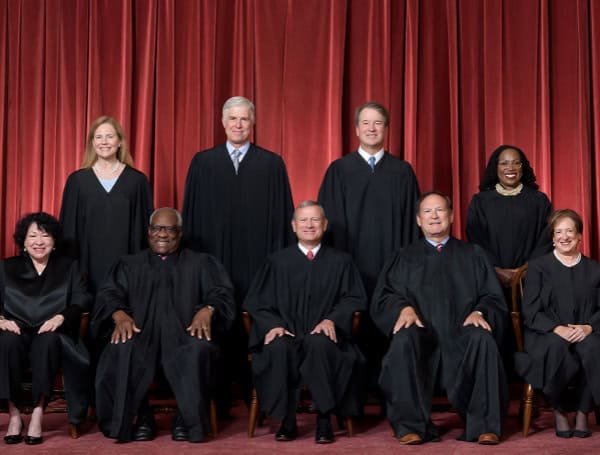The U.S. Supreme Court on Monday declined to review a case challenging an Illinois city’s abortion clinic buffer zone ordinance, prompting a sharp dissent from Justice Clarence Thomas, who argued that the Court missed an opportunity to clarify the status of a controversial precedent that has long been criticized for undermining First Amendment rights.
The case, Coalition Life v. City of Carbondale, centered on a 2023 ordinance that established a 100-foot buffer zone around abortion clinics, prohibiting individuals from approaching within 8 feet of another person without consent to engage in “oral protest, education, or counseling.”
READ: Florida Gov. DeSantis Touts Wife’s Conservative Credentials, Questions Byron Donalds’ Record
The ordinance mirrored a Colorado law upheld by the Supreme Court in Hill v. Colorado (2000), a decision that has since been widely criticized as an aberration in First Amendment jurisprudence.
In a strongly worded dissent, Justice Thomas argued that the Court should have taken the case to explicitly overrule Hill, which he described as “defunct,” “erroneous,” and “long-discredited.” Thomas, joined by Justices Samuel Alito and Neil Gorsuch, contended that Hill has been effectively dismantled by subsequent rulings, including McCullen v. Coakley (2014) and Reed v. Town of Gilbert (2015), which established stricter standards for content-based speech restrictions.
“It is unclear what, if anything, is left of Hill,” Thomas wrote. “Our refusal to provide clarity is an abdication of our judicial duty.” He emphasized that lower courts continue to feel bound by Hill, creating confusion and leaving constitutional rights “hanging in the balance.”
The Carbondale ordinance, passed in 2023, was nearly identical to the Colorado law upheld in Hill. It prohibited sidewalk counselors from engaging in peaceful conversations with individuals entering abortion clinics, effectively forcing them to stand far away from their intended audience. Coalition Life, a Missouri-based nonprofit that organizes sidewalk counseling outside abortion clinics, sued the city, arguing that the ordinance violated the First Amendment.
READ: Privilege, Not A Right: Federal Judge Denies AP’s Request To Restore Access To Oval Office
Both the district court and the Seventh Circuit Court of Appeals dismissed the case, citing Hill as binding precedent. Coalition Life appealed to the Supreme Court, urging the justices to clarify whether Hill remains good law in light of subsequent rulings.
Justice Thomas’s dissent highlights the ongoing tension between free speech rights and regulations targeting abortion-related speech. He argued that Hill represents a form of “abortion exceptionalism” that has distorted First Amendment principles.
“Hill manipulated this Court’s First Amendment jurisprudence precisely to disfavor opponents of abortion and their right to persuade women contemplating abortion that what they are doing is wrong,” Thomas wrote. He noted that the Court’s recent decision in Dobbs v. Jackson Women’s Health Organization (2022), which overturned Roe v. Wade, further undermined Hill by rejecting the notion of abortion as a constitutionally protected right.
READ: DeSantis Unleashes Florida DOGE: Slashing Waste, Supercharging Government Efficiency
While the Supreme Court’s decision to deny certiorari leaves Hill technically intact, Justice Thomas’s dissent signals that the precedent is on shaky ground. Lower courts may now face increased pressure to reevaluate buffer zone laws in light of the Court’s evolving First Amendment jurisprudence.
For now, the denial leaves unresolved the question of how far governments can go in restricting speech near abortion clinics. As Justice Thomas concluded, “We are responsible for the confusion among the lower courts, and it is our job to fix it.”
Please make a small donation to the Tampa Free Press to help sustain independent journalism. Your contribution enables us to continue delivering high-quality, local, and national news coverage.
Connect with us: Follow the Tampa Free Press on Facebook and Twitter for breaking news and updates.
Sign up: Subscribe to our free newsletter for a curated selection of top stories delivered straight to your inbox.

